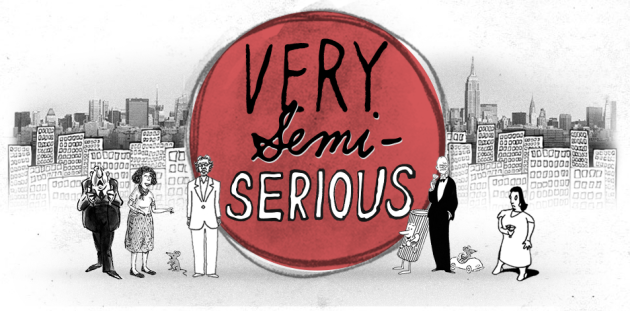
by Pamela Rafalow Grossman
“Very Semi-Serious”: New Yorker Cartoonists in a New Film
 “Can I come back?” asks cartoonist Liana Finck of Bob Mankoff, longtime cartoonist for—and now cartoon editor of—The New Yorker.
“Can I come back?” asks cartoonist Liana Finck of Bob Mankoff, longtime cartoonist for—and now cartoon editor of—The New Yorker.
Finck has brought some of her work to Mankoff’s office at the magazine, and received thoughtful feedback but not the break-in acceptance she was hoping for. It’s a sweet and poignant moment in director Leah Wolchok’s documentary Very Semi-Serious, which chronicles New Yorker cartoonists past and present and the process by which Mankoff makes his selections. In Finck’s words are reflected a near-universal hope for success and an equally commonplace fear of rejection. The warm and thoughtful film is filled with such touching, relatable and, unsurprisingly, funny moments. It had its world premiere in April of 2015 at the Tribeca Film Festival (where it was announced that 33% of the festival’s feature filmmakers this year were women, the highest percentage in its 14-year history) and will be shown on HBO starting December 7th after a brief theatrical run.
Finck is a former Lilith intern whose work has been appearing regularly here since she was in high school—and she did keep trying with The New Yorker, eventually landing several cartoons there. On October 2, Finck and New Yorker cartoonists Mort Gerberg and Emily Flake, along with Mankoff, took part in a panel discussion after the film, moderated by widely adored New Yorker cartooning fixture Roz Chast, part of the annual New Yorker Festival. (Chast’s interview moments in the film are often laugh-out-loud hilarious—as when she explains that she prefers indoor settings to venturing out: “The temperature’s never right—it’s too hot, it’s too cold, it’s too sunny, it’s too rainy…there are branches!” And who knew she had a collection of vintage cans?) The fact that three of the five people onstage for the panel were women reflects the deliberate efforts The New Yorker has made, under editor David Remnick, to break out of the old-boys’-club mold.
In the film, parents, parenting, and family issues are prominent topics of discussion. Gerberg recounts that his immigrant father, a tailor, insisted that being a cartoonist was “no job for a Jewish person” and that Gerberg would be disinherited if he pursued the field. (Gerberg notes wryly that since he was earning more than his father, this was something of a moot point.) Roz Chast recalls her overbearing Mom and Mankoff his mother’s hypochondria; and Flake croons over the deliciousness of her toddler—and wonders if it will be difficult to continue to generate humor if, in her life and career, she’s feeling happy and content.
A visit to the Mankoff home reveals a family event that has caused deep sadness for Mankoff, his wife, Cory, and their daughter, Sarah—but even as the three hash this out, humor emerges. Sarah remembers responding “That’s not funny” to one of her father’s quips and being admonished by her mom not to let him hear such a thing. “Maybe it was a sensitive time for him,” Cory suggests. “Isn’t it always?” Sarah responds, affectionately rolling her eyes.
Thoughts of family bonds, stresses, and memories likewise made their way to the panel discussion. Finck enthusiastically recalled her mother’s cooking (dishes both intended and “accidental”), and all the panelists recalled interests and talents encouraged or ignored by their families.
Taking things into the present, Flake joked, “We don’t interrupt women anymore, Bob!” when Mankoff started to talk over her; and to Chast’s question of what the panelists like to read, Mankoff said he mainly reads nonfiction, while Finck revealed that she recently loved the works of pseudonymous-but-celebrated author Elena Ferrante and that Nabokov is “still my darling.”
The panel concluded with Chast asking the others what they do when ideas aren’t flowing and nothing seems funny. “You just have to put yourself in the room with the paper,” says Mankoff—sound advice across numerous disciplines.
Once offstage, Finck was joined by her parents and Chast by her young-adult son; Flake and Chast marveled at the fact that you can have a toddler at one moment and a teenager at seemingly the next. Standing beside the cartoonists, the family members beamed.
Very Semi-Serious is a film to look forward to: You might come for its laughs, but you’ll remember its wisdom, heart, and soul.